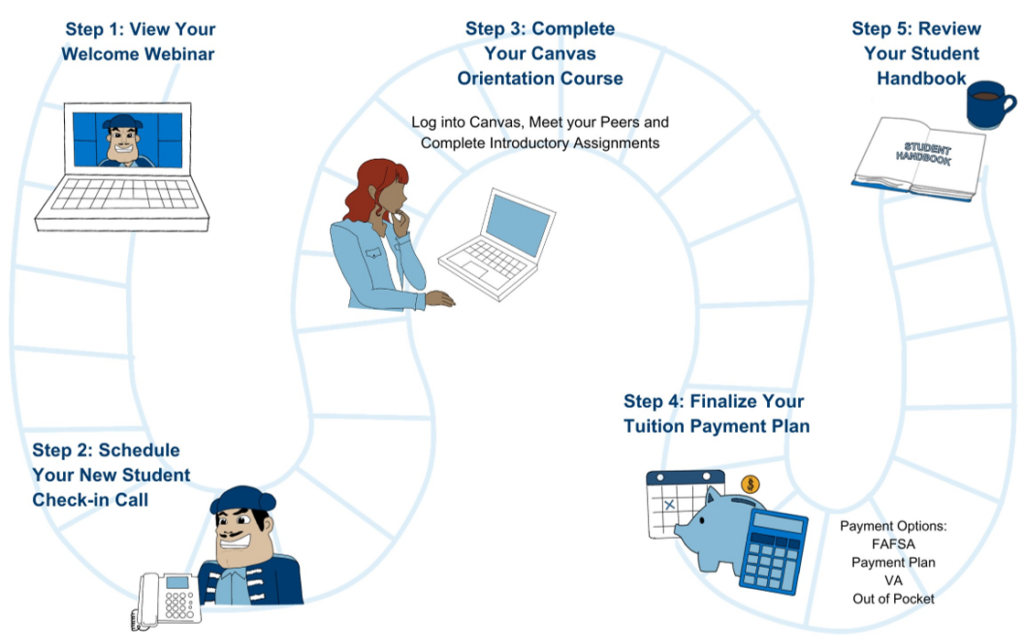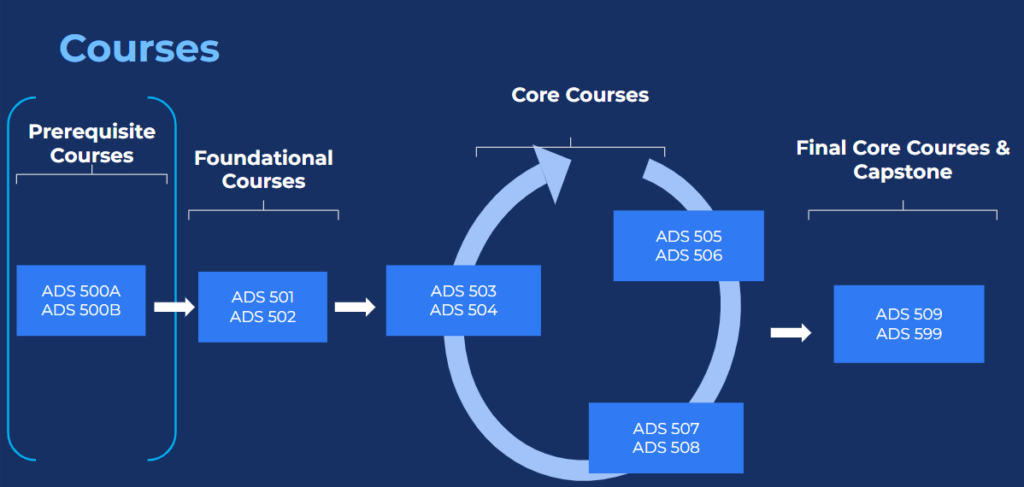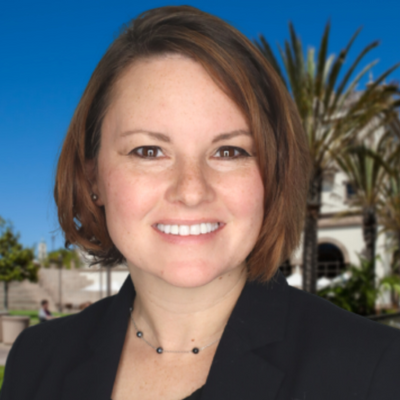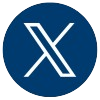Student Success Center
MS in Applied Data Science
Welcome!
As an online student, most of your interactions with the university will be done through various websites. For example:
- You’ll use your USD Email Address for all university-related communications.
- You'll use Canvas for all of your coursework and assignments. See Canvas Tips and Tricks page.
- You’ll use your MySanDiego Portal for tuition payments and to access most campus resources.
- You’ll use this site, your Student Success Center, to get specific information about textbook information, deadlines, and more!
- If you identify as alumni, visit our Alumni page to remain engaged.


COMPLETE YOUR MANDATORY NEW STUDENT CHECKLIST
Our number one priority is you! Our team has prepared a checklist of items that will set you up for success and clarify all action items as a new student. After you are enrolled for your first term and receive a confirmation email from a member of our team, please complete and review all of the following before classes start.
1. View Your Mandatory New Student Welcome Webinar
This webinar will go over a comprehensive look at your program and what to expect as an online learner including resources and tips for success. Each webinar should last around 30-40 minutes. Once you have been registered for classes and receive a confirmation email from our team, you will be emailed the link to schedule your welcome webinar to your @sandiego.edu email address.
2. Schedule Your New Student Check-in Call
In this call, you’ll “meet” a member of your Student Success Team for your program. This will be a chance for us to answer any additional questions you have before you start your first term. Please be sure to have any Canvas-related, program-related, or finance-related questions prepared. After attending the Welcome Webinar, you will be prompted to schedule your call using a scheduling link.
3. Complete Your Canvas Orientation Course - Due August 29, 2025
Once you have been registered in your classes, you will be able to access your New Student Orientation Course on Canvas within 4 hours. When accessing Canvas, please make sure to use Firefox or Chrome as your browser.
The New Student Orientation course is designed to help you navigate your way around the course's layout prior to beginning your first class. You will learn where to find the syllabus, course schedule, assignments, and discussion boards.
Your Orientation is mandatory, and must be completed before the first day of class—so we encourage you to get started! Please plan to spend about 8-10 hours completing the Orientation course. You can move through the Orientation at your own pace, so schedule your time accordingly.
Looking for assistance?
4. Finalize Your Tuition Payment Plan
We recommend that students start this planning early as some funding sources can take some time to process. Tuition payments should be completed in full by the first day of the semester. Visit the "Tuition and Payment Methods" section for more information.
5. Review your Student Handbook
Please make sure to review your student handbook prior to the first day of class, and reference it as needed throughout your program. The handbook is where you can find information on academic expectations, drop and refund policy, technology requirements, curriculum, frequently asked questions, and more.

IMPORTANT DATES
Below is a list of significant dates regarding the registration process, payment deadlines, and other important academic and program deadlines.
Fall 2025 Dates and Deadlines
| Important Dates | Date |
|---|---|
| Registration Opens | June 30, 2025 |
| Application Deadline | August 1, 2025 |
| Registration Deadline | August 15, 2025 |
| Orientation Course Due Date | August 29, 2025 |
| Last Day to Drop with 100% Tuition Refund* | September 1, 2025 |
| Payment Due Date | September 2, 2025 |
| Semester Begins | September 2, 2025 |
| First Course Start Date | September 2, 2025 |
| Last Day to Drop with 95% Tuition Refund/ Drop Deadline* | September 5, 2025 |
| Last Day to Withdraw from Course A | September 29, 2025 |
| First Course End Date | October 20, 2025 |
| Second Course Start Date | October 21, 2025 |
| First Course Final Grade Submission Due Date | November 3, 2025 |
| Last Day to Withdraw from Course B | November 17, 2025 |
| Second Course End Date | December 8, 2025 |
| Semester Ends | December 8, 2025 |
| Second Course Final Grade Submission Due Date | December 22, 2025 |
Spring 2026 Dates and Deadlines
| Important Dates | Date |
|---|---|
| Registration Opens | November 3, 2025 |
| Application Deadline | December 1, 2025 |
| Registration Deadline | December 15, 2025 |
| Orientation Course Due Date | January 2, 2026 |
| Last Day to Drop with 100% Tuition Refund* | January 5, 2026 |
| Payment Due Date | January 6, 2026 |
| First Course Start Date | January 6, 2026 |
| Last Day to Drop with 95% Tuition Refund/ Drop Deadline* | January 9, 2026 |
| Last Day to Withdraw from Course A | February 2, 2026 |
| First Course End Date | February 23, 2026 |
| Second Course Start Date | February 24, 2026 |
| First Course Final Grade Submission Due Date | March 9, 2026 |
| Last Day to Withdraw from Course B | March 23, 2026 |
| Second Course End Date | April 13, 2026 |
| Semester Ends | April 13, 2026 |
| Second Course Final Grade Submission Due Date | April 27, 2026 |
Summer 2025 Dates and Deadlines
| Important Dates | Date |
|---|---|
| Registration Opens | March 3, 2025 |
| Application Deadline | April 4, 2025 |
| Registration Deadline | April 18, 2025 |
| Orientation Course Due Date | May 2, 2025 |
| Last Day to Drop with 100% Tuition Refund* | May 5, 2025 |
| Payment Due Date | May 6, 2025 |
| Semester Begins | May 6, 2025 |
| First Course Start Date | May 6, 2025 |
| Last Day to Drop with 95% Tuition Refund/ Drop Deadline* | May 9, 2025 |
| Last Day to Withdraw from Course A | June 2, 2025 |
| First Course End Date | June 23, 2025 |
| Second Course Start Date | June 24, 2025 |
| First Course Final Grade Submission Due Date | July 7, 2025 |
| Last Day to Withdraw from Course B | July 21, 2025 |
| Second Course Final Grade Submission Due Date | August 25, 2025 |
| Semester Ends | August 11, 2025 |
* During the first semester of enrollment, any tuition refund amounts will not include the non-refundable enrollment deposit amount (5% of tuition).
Graduate Student Success Program
Dates: July 28-30th, 2025
The Graduate Student Success Program is an optional opportunity for students to unpack the hidden curriculum of graduate school, connect with other graduate students across the university, and feel empowered to step into the new identity of being a graduate student and scholar. Through workshops and presentations, our virtual program will address questions such as:
- How do I make the most of my experience as a graduate student?
- What if I feel like I don’t belong here?
- How do I interact with faculty as a graduate student?
- How do I tend to my financial wellness while in graduate school?
- What are some strategies to access support?
Download a pdf of your academic calendar
Upcoming Events
Don't miss out on connecting with your University of San Diego global community through a variety of events - featuring academic workshops, cultural celebrations, networking events, and more. There’s something for everyone!
Class Registration Directions
You have most likely already filled out an Enrollment Agreement, which enables our team to register you for classes each term. No further action is required on your part.
If you are not able to register for both of your courses in a given term, please contact your program coordinator immediately. This often happens for students who need to take a leave of absence.
Textbook information
Students are required to have their textbooks on hand by the first day of class. Unless otherwise specified, students may select any vendor they prefer (such as Amazon.com, Half.com, Alibris.com, etc.) to purchase their course materials. In the event a specific vendor is required, it will be specified in the course materials list. The best way to ensure that you have the correct book is to search by the ISBN number(s) listed on the book list.
Physical copies of books are not on hand at the USD Torero Store. The USD Torero online store does offer price comparisons for different online vendors for some books.
Although all textbooks for all courses are listed, students only need to purchase the items for the classes they are taking for the semester.
Digital Inclusive Access (IA) - Integrated VitalSource Textbooks
If your course is indicated to have a "Digital Inclusive Access" textbook, you do have the option to use the integrated Vitalsource e-textbook without needing to purchase a textbook through an outside vendor. For more information, view the "Digital Inclusive Access" FAQs document.
- Students are able to access the e-textbook directly in the course without worrying about purchasing the wrong version or textbook!
- If your course is indicated as using “Digital Inclusive Access” on the textbook list, please note that you must opt-out within the first 7 days of each course to avoid being charged for the guaranteed-lowest price textbook.
- If you do intend to use “Digital Inclusive Access”, no further action is required after you create a Vitalsource account.
- No refunds can be issued once the textbook charge has been assessed.
By using Vitalsource e-Textbooks, students are able to use study tools in Bookshelf such as highlighting, printing limited pages/chapters, sharing notes, and using the Bookshelf CoachMe tool to test their learning while they read.
PAYing for your program
Tuition at USD is billed per semester, not per course. Payment (or enrollment in an official USD payment plan) is always due by the first day of the semester. Students may not carry balances from one semester to the next.
Accounts with outstanding balances after the official payment due date may be subject to course cancellations/removal or a student account hold during the semester; related holds can prevent upcoming registration, graduation, or obtaining transcripts.
Remember: tuition is always due by the first day of each semester.
Tuition amounts shown on this website, or in other university publications or web pages, represent tuition and fees as currently approved. However, the University of San Diego reserves the right to increase or modify tuition and fees without prior notice and to make such modifications applicable to students enrolled at USD at that time as well as to incoming students. In addition, all tuition amounts and fees are subject to change at any time for correction of errors.
Program Tuition
Once you have been registered for your courses, your student account will reflect the appropriate tuition costs according to your program. Payments not received by the deadlines are subject to late fees. Your program’s tuition is the following:
- Per Unit (classes are typically 3-units) = $965
- Per Semester (assuming 6-units per semester) = $5,790
- Total Program Cost (including 5 semesters) = $28,950 (without prerequisites)
- Total Program Cost (including 6 semesters) = $34,740 (with prerequisites)
Enrollment deposit
Please note that students in USD’s MS in Applied Data Science program are required to submit a one-time non-refundable deposit in the amount of 5% of the first semester's tuition. The payment will automatically be applied to your first-semester tuition.
Slack Pro
All students are charged a $20 fee each semester to cover a Slack Pro Account that allows you to have access to your MS-ADS Slack student and instructor community. This fee is non-refundable and cannot be waived for any students. Only active students will maintain access to their Slack Pro, and students will lose access to this account upon graduation.
Students who need to re-take or withdraw from a course may need to pay additional fees according to the Refund/Drop Deadline policies listed in your Student Handbook.
If you have any questions about your Student Account, please reach out to the Torero Hub via this request form. All costs and fees are subject to change and are based on the academic year of enrollment.
Refund Policy
Students will be registered for their prescribed courses each semester. All courses must be dropped prior to the first day of the semester to receive a 100% tuition refund* and within the first three days of the start date of the semester to receive a 95% tuition refund*. No refund (reversal of tuition) will be provided after the third day of the semester for any class. *During the first semester of enrollment, any tuition refund amounts will not include the non-refundable enrollment deposit amount (5% of tuition).
DEGREE PROGRESS and COMMENCEMENT
DegreeWorks
You can track your progress toward earning your degree using the Degree Works feature in your MySanDiego student portal. Degree Works shows you which courses you have completed, grades, cumulative GPA, any outstanding graduation requirements, and more!
To access Degree Works:
- Log in to your MySanDiego student portal.
- Under the “Torero Hub” tab, click on “My Academics.”
- On the right-hand side under “My Academic Resources”, click on “Degree Works.”
Petition to Graduate
Submitting your petition to graduate is a requirement for every student. About a semester before your final term, you will be reminded by your Program Coordinator to submit your petition to graduate. Once completed, your Academic Coordinator will review your academic record and contact you if there are any outstanding requirements or issues.
Commencement timing
If you are planning on participating in the commencement ceremony (which means walking in your cap and gown here on campus), you will be invited to come to the University of San Diego to participate in the ceremony. Commencement details and information will be sent from your Student Success Team around the month of February.
- There is only one commencement ceremony each academic year in May.
- Fall and Spring graduates will be invited to the commencement ceremony the May after they graduate.
- Summer graduates will be invited to the commencement ceremony the May before they graduate.
Diploma Details
The Registrar will process their final audit of the degrees 6-8 weeks after grades are posted for your final semester. Once the degree is conferred in the system, the Registrar will order your diploma from the vendor and the vendor will send it to you directly to the address that was listed on your petition to graduate.
If your mailing address changes after you submit your Petition to Graduate, please notify the Graduate Records office at (619) 260-2217 or [email protected].
You will receive a digital diploma to your @sandiego.edu email address once your degree has been officially conferred.
You will also receive a physical diploma. Mailing time is an additional 6-8 weeks from the date of order, and you will likely receive your diploma in the mail in 3-4 months after you have completed your degree requirements.
Course Details
program requirements
The 30-unit program will consist of ten courses. Please note, some students will be required to complete prerequisite courses which will be in addition to the 30-unit program. Courses will be offered year-round with three semesters every year: Spring, Summer, and Fall. Each semester will last 14 weeks. Students will take two courses per semester. Courses will run for seven weeks each with a one- or two-week break in between semesters. This intensive format will allow students to focus on one course at a time and to still complete the degree program in 20 months.

Course Titles and Descriptions
Probability and Statistics for Data Science (ADS 500A)
This course is an introduction to probability and statistical concepts and their applications in solving real-world problems. This prerequisite course provides a solid background in the application of probability and statistics that will form the basis for advanced data science methods. Statistical concepts, probability theory, random and multivariate variables, data and sampling distributions, descriptive statistics, and hypothesis testing will be covered. The use of computer-based applications for the performance of basic statistics will be utilized. Covered topics include the numerical and graphical description of data, elements of probability, sampling distributions, probability distribution functions, estimation of population parameters, and hypothesis tests. This course will combine the learnings from texts, case studies, and standard organizational processes with practical problem-solving skills to present, structure, and plan the problem as it would be presented in large enterprises, and execute the steps in a structured analytics process.
Data Science Programming (ADS 500B)
This course is an introduction to fundamental concepts of programming and problem-solving techniques for data science. Python and R are the languages used to analyze and deliver insights from real-world datasets. Topics include the basics of Python and R, data acquisition, integration and transformation, problem understanding, data preparation, standardization, and exploratory data analysis. In addition, command line tools and editors are explored in UNIX, and methods to access and analyze RDBMS databases are examined. The course ends with introducing students to the basics of machine learning models.
Foundations of Data Science and Data Ethics (ADS 501)
This course covers an introduction to the methods, concepts, and ethical considerations found and practiced in the field of professional data science. Topics include defining and structuring the problem, managing the business, the CRISP-DM and Agile processes, ensuring the science in data science using the scientific method, project management, managing ethical concerns and model bias, and the importance of performing exploratory data analysis. This course will combine the learnings from case studies, texts, and standard organizational processes with practical problem-solving skills to present, structure, plan, and present the problem as it would be done in large enterprises, including executing steps in the data science work-stream. Prerequisites: ADS 500A and ADS 500B. Both ADS 500A and ADS 500B can be waived by the Academic Director based on an evaluation of the student's professional background and academic history.
Applied Data Mining (ADS 502)
Data Mining is one of the most important topics in the data science field. This course discusses theoretical concepts and practical algorithms for both supervised and unsupervised learning techniques. The course provides data mining principles, methods, and applications with a variety of integrated theoretical and practical examples in classification, association analysis, cluster analysis, and anomaly detection. This course also includes applied examples associated with each topic in data mining using R and Python programming languages. Prerequisites: ADS 500A and ADS 500B. Both ADS 500A and ADS 500B can be waived by the Academic Director based on an evaluation of the student's professional background and academic history.
Applied Predictive Modeling (ADS 503)
This course provides a working knowledge of applied predictive modeling. Students will obtain a broad understanding of model training, evaluations, and development procedures with a wide variety of applications to real-world problems. This course introduces best practices for managing data science projects and presenting analytical results to technical and non-technical audiences. Course topics include linear and non-linear regression modeling methods, linear and non-linear classification modeling methods, model selection, variable importance, variable selection and model applications, code, and R package management using RStudio. Prerequisites: ADS 501 and ADS 502
Machine Learning and Deep Learning for Data Science (ADS 504)
This course covers the study of supervised and unsupervised algorithms in the Machine Learning context. Emphasis on formulating, choosing, applying, implementing, and evaluating machine learning models to capture key patterns exhibited in cross-sectional data and longitudinal data. This course also discusses the considerations of model complexity interpretations and implementation in real-world applications using Python and associated packages. An introduction to Deep Learning is provided in this course. Prerequisites: ADS 501 and ADS 502
Applied Data Science for Business (ADS 505)
Data science skills are in high demand across a wide variety of industries. This course focuses on real-world use cases of data mining applications, including predicting consumer purchase behavior, brand loyalty, product prices, sales up-lift, basis of purchase, direct marketing campaign cost-effectiveness, rideshare cancellations, competitive online auctions, recommendation engines, and segmenting and identifying important customers. This course covers practical, business-oriented examples and use cases associated with each topic in data mining using Python. Data visualization, effective data storytelling, and analytical communication are being taught. Tableau, one of the most popular business analytics and dashboard tools, is practiced in this course. Prerequisites: ADS 501 and ADS 502
Applied Time Series Analysis (ADS 506)
Many datasets naturally have a time series component: records collected over time, financial data, biological data signals such as brain waves or blood glucose levels, weather, and seasonal information. Practicing data scientists need to identify when they encounter time series data and when to apply suitable techniques. This course will cover the major topics in time series analysis and forecasting (prediction), including stationary and non-stationary models, autoregressive and integrated autoregressive models, models for estimation, and spectral analysis using R. Different methods of estimation will be leveraged, including maximum likelihood, Bayesian, and spectral estimation. These approaches will be applied to real-world datasets, culminating in a complete analysis from end to end. Prerequisites: ADS 501 and ADS 502
Practical Data Engineering (ADS 507)
In this course, students will learn about the discipline of data engineering. They will learn what data engineers are, what they do and how it relates to the field of data science. Topics will include data architecture, relational databases, SQL, data pipelines (ETL and ELT), ethical data engineering (data security and privacy), and data engineering best practices. Prerequisites: ADS 501 and ADS 502
Data Science with Cloud Computing (ADS 508)
This course covers the fundamental concepts of cloud computing as it impacts the field of data science. Course topics include cloud economics, distributed storage, SageMaker ecosystem, distributed processing, model tuning, natural language processing, and model deployment considerations in the cloud. This course will combine the learnings from texts and relevant technical articles with practical hands-on skills to design, implement, and recommend solutions for the business problem as it would be presented in the business world, and execute the steps in a structured model development process. Prerequisites: ADS 501 and ADS 502
Applied Large Language Models for Data Science (ADS 509)
This course focuses on the application of large language models (LLMs) for data science using Python. Topics include the collection, preparation, and analysis of textual data, the application of pre-trained LLMs to textual data analysis and classification problems, and the application of generative AI models for use in data science pipelines and products. Prerequisites: ADS 501, ADS 502, ADS 503, ADS 504, ADS 505, ADS 506, ADS 507, and ADS 508
Capstone Project (599)
The purpose of this Capstone Project is for students to apply their acquired theoretical knowledge obtained during the Applied Data Science Program to a research-based, code-oriented data science project. During the project, students lead the entirety of the end-to-end process that involves the collection and processing of the data while utilizing the appropriate analytical methods. The project will be documented in an academic journal style article and orally presented, including technical content, in a recorded presentation. Students will work in teams and are encouraged to find project topics that originate from real-world domains in order to tackle unique problem statements that have real-world impact. Prerequisites: ADS 501, ADS 502, ADS 503, ADS 504, ADS 505, ADS 506, ADS 507, and ADS 508
Student Resources
This list is helpful resources that will set you up for success. Haven’t written in APA formatting since your undergraduate program? We’ve got you covered! Want to know what type of computer you will need? No problem. We have listed helpful resources below.
Academic Requirements and Resources
Technical Requirements
To complete the activities in your courses and to access course content, please verify that you have the following technologies and plug-ins available:
- Computer – A PC or Mac with 16GB of RAM, an i5 or i7 quad-core processor, and 100GB of free drive space is highly recommended.
- Browser Plug-ins – Windows Media Player, QuickTime, Flash, Adobe Reader, and Java.
- Mozilla Firefox is the recommended browser.
- Microsoft Office is required. If you are using Office 2003 or earlier, Download and install the Microsoft Office Compatibility pack.
- Speaker or headset – to listen to multimedia
- Webcam – for recording video (if needed).
- High-speed internet connection strongly encouraged (DSL or better)
Slack – Your Course Messaging Tool
Each time your course starts, you will be invited to join a Slack messaging channel for your MS-AAI program. In the channel, you'll be able to easily message your peers and faculty in a dynamic way. New to Slack? No problem - there are a variety of introductory resources to get you up to speed.
If you are having trouble accessing your Slack channel, please email your Program Coordinator using the information at the top of this website.
- Please note that we will invite your @sandiego.edu email address to the Slack channel, and we will delete personal email accounts to maintain program and student privacy.
- While participating in the Slack channel, please be respectful of everyone and note that all USD student conduct policies apply to conversations in the related messaging threads.
- If you are having trouble accessing your Slack channel, please email your Program Coordinator using the information at the top of this website.
Additional Academic Resources
Here are some free recommended resources to supplement the course content in your program:
- Khan Academy: Calculus
- Khan Academy: Statistics
- Math is Fun: Statistics
- Khan Academy: Linear Algebra
- Calculus eTextbook by Gilbert Strang
- LearnPython.org: Free interactive Python tutorial
- DataCamp.com: free interactive Introduction to Python
Paid for Resources
Graduate Writing Expectations and Tips
All writing assignments must be formatted according to APA standards. Discussion posts must contain the appropriate APA citations. If you want additional writing support, we recommend Purdue Online Writing Lab (OWL@Purdue). In addition to general writing support, the website includes a special section dedicated to APA formatting guidelines.
Another helpful writing resource is the School of Leadership and Education Sciences (SOLES) Graduate Student Writing Center. Enrolled students can submit assignments for review by a writing professional.
Academic Standards for Artificial Intelligence (AI)
With the rise of AI writing assistants, students must ensure that they use this new technology ethically and honestly. Consult this document for guidance.
Download Microsoft Office 365 (Free for USD Students)
Students at the University of San Diego are able to download Microsoft Office 365 for free! If you don’t have it already, you can download the Microsoft Office 365 suite using your USD student email.
Accessibility Student Resources
Students may request formal accommodations from the Disability and Learning Difference Resources Center and may also use the following accessibility tools:
Accessibility Student Resources
Tailored Support for Neurodiverse College Students Webinar Recording
External Tutoring Resource
USD does not offer subject-specific tutoring resources, so students who are looking for tutoring support are encouraged to identify a tutor using Wyzant.com. Please note that Wyzant is not a USD-managed resource, so use them at your own discretion.
University Resources
TimelyCare - Telehealth for USD Students
TimelyCare is a provider of 24/7, no-cost telehealth services for USD students to address common conditions that can be safely diagnosed and treated remotely. TimelyCare services are available at no cost to the student. Services include:
- Live and on-demand self-care sessions (yoga, breathing, stretching)
- Access to on-demand counselors for emotional health support
- Access to schedule a session with a licensed counselor (up to 12 times per year)
- View the Nurturing Balance Webinar Recording to learn about more resources
Economic Resources List
USD's Case Management team has compiled a list of on-campus (local to San Diego) and national economic resources to help students find assistance with a variety of life aspects such as housing, food, mental health, parenting, etc. If you have a need or concern that isn’t addressed by the resources included in this list, please reach out to your Program Coordinator for further assistance. Based on the support, we may refer you to schedule an appointment with a case manager.
Campus Partner Email Opt-Out
Get too many emails? Follow our email opt-out guide to optimize your USD email experience.
On-Campus Resources
If you live local to San Diego, the USD Campus is available to all of our students and includes these additional resources. Even if you far away from campus, many offices offer remote options.
identity resources
Military Student Resources
USD provides student-focused services to all USD military-connected students, including student veterans, active-duty, dependent children, and spouses.
- Get started by requesting your Request to Certify each semester.
- Explore Military Scholarship Opportunities.
- Join the Student Veteran Organization .
- Leverage the partnership between USD and 50strong that brings together employers and veterans.
- Upon graduation, connect with the Alumni Veteran Network
First-Generation Student Resources
USD welcomes first-generation college and first-generation graduate students. Please view the resources below to connect with your first-gen peers!
- Visit the USD First-Generation website.
- FirstGen Forward with Annual Free & Virtual Symposium
- Instagram accounts: @usd_fgsa and @usdfirstgen.
- Contact the First-Gen Action Team at [email protected]
- View the USD First-Generation Student Guide.
- Sign up for the First-Gen Network Newsletter (sign up here).
- Facebook account: USD First-Generation Students.
- Watch the First Gen Wellness Webinar Recording.
Student Parent Resources
Many students who attend USD are also parents. USD offers the following resources:
- Join the Parenting Student listserv: [email protected]
- Pregnancy Resources: Several USD Centers are available to accompany pregnant students as they navigate pregnancy while a student at USD.
- Financial Aid: The university’s Financial Aid Offices can help you qualify for additional loans to cover medical expenses and child care.
- Childcare Solutions: USD supports many resources for finding infant and child care to meet your family’s needs.
- View a recording of our Student Parent Time Management webinar.
DACA/Undocumented Student Resources
Please view the USD information trifold for current and prospective students. It is also available in Spanish.
Review the Higher Ed Immigation Portal website which includes some useful information and connections to the undocumented student community, state and national policies, information on graduate and professional school access, retention and success. It is a living document that will be updated regularly and include any new resources that campuses and organizations develop.
Online student handbook
The handbook is where you can find information on academic expectations, drop and refund policy, technology requirements, curriculum, frequently asked questions, and more.
graduate student code of rights and responsibilities
It is the policy of the University of San Diego to adhere to the rules and regulations as announced in this brochure or other University Publications. The University nevertheless hereby gives notice that it reserves the right to expand or delete or otherwise modify this online publication whenever such changes are adjudged by it to be desirable or necessary. Changes will be made periodically as needed.
Canvas @ USD
In your program, you can think of Canvas as your virtual tool to share information with professors and peers. You will use Canvas to access your course content, find course syllabi, review your assignments, and more. Be sure to use your USD credentials to log in. If you have any difficulty logging into your course, be sure to contact ITS at (619) 260-7900 or [email protected].
Netiquette Guidelines
The concept of netiquette covers proper communication online. Read our guidelines to help cultivate a supportive and productive online environment.
your partners toward success
At USD, you join a community of individuals who are all committed to one common goal: your success. As you familiarize yourself with your team, take the opportunity to virtually meet and connect with the resources available to you as a student. Click on the profiles below to learn more about each office or staff member and watch a brief video about their role in supporting you through graduation.















USD Quick Links
- USD Directory (For Faculty or Staff Contact Information)
- Torero Hub
- Health and Wellness
- SOLES Graduate Writing Center
- Military and Veterans Program Center
- Disability and Learning Difference Resource Center
- Copley Library
- Career Development Center
- Campus Recreation (Remote and On-Campus Classes Offered)
Career and professional resources
Whether you're hoping to find a new job or earn a promotion, USD has a wealth of resources available to prepare you for your dream role.
MS-ADS professional resources
- Recommended Conferences
- ML Model Deployment Using Docker Workshop Recording (Password: eS4%Mckn)
- Applications of Machine Learning Workshop Recording
- Intro to Careers in AI Workshop Recording
- AI in Healthcare Recording
- How to Thrive as a Newly Minted AI Practitioner Recording
- Intro to Networking and Interviewing
- AI and Data Science Product Management Recording
- AI in Action: Perplexity AI Recording
Frequently Asked Questions
How much is my tuition?
Tuition for the MS-ADS program is $965 per unit.
Tuition amounts shown on this website, or in other university publications or web pages, represent tuition and fees as currently approved. However, the University of San Diego reserves the right to increase or modify tuition and fees without prior notice and to make such modifications applicable to students enrolled at USD at that time as well as to incoming students. In addition, all tuition amounts and fees are subject to change at any time for correction of errors. Please note that the displayed tuition covers only the cost of courses, and additional expenses such as books and other fees are not included.
How many units is my program?
The MS-ADS program is a total of 30 units.
Students will enroll in two prescribed courses each semester for a total of 6 semester units.
Is this a full-time or part-time program?
The University of San Diego considers 9 or more units as full-time student status. Your program is designed to be part-time, and students enroll in just 6 units per semester. There is no full-time option for this program.
How do I register or drop classes?
All students are manually enrolled each semester by the USD Student Success team. If you are not able to enroll for a term or if you need to drop your courses, it is your responsibility to notify your Program Coordinator. All students will be held to the respective drop deadlines and refund schedule detailed in your Student Handbook.
Where do I find my bill and how do I pay it?
Login to your my.sandiego.edu student portal. Under the “My Student Account” tab, review the tutorials for directions on how to view and pay your bill, set up a payment plan, and enroll in eRefund (Direct Deposit). View the “Tuition and Payment Methods” on your Student Success Center for further details.
Where can I view my final grades?
Log into your my.sandiego.edu student portal and navigate to the “Torero Hub” section on the sidebar. Click on the “My Academics” tab and locate the “View My Grades” link in the top-middle section. Alternatively, you can view your program progress at a glance using the “Degree Works” link.
If you notice a grade inconsistency between Canvas and your MySanDiego portal, please email your instructor to verify what the final grade should be. Your instructor has the ability to update the posted grade.
How do I see my degree plan and track my progress?
Log into your my.sandiego.edu student portal and then use the “Degree Works” link to view your degree audit.
You can find the “Degree Works” link in the Torero Hub under the “My Academics” page. If you are interested in requesting a tailored degree plan, please email [email protected].
What if I need to take a break from courses?
If you need to take time off from your program, please email your Program Coordinator or the Student Success team at [email protected]. Since you have submitted your enrollment commitment, our team will automatically register you in courses each term unless you have previously notified the team about taking a break.
How do I order transcripts?
To order your official, unofficial, or e-transcript(s), view the transcript ordering options page. Otherwise, you can view unofficial/order official transcripts through your MySanDiego portal. Under the “Torero Hub” sidebar option, click on the “My Academics” page, then click on “Request Official Transcript” under the “My Classes” section.
When will I get my diploma?
Congratulations on finishing your program! Diplomas are mailed about 6-8 weeks after the degree requirements have been met and processed. Diplomas are mailed to the current address on file at the time degree requirements are completed. (To check your address information, login to your my.sandiego.edu student portal and view your personal information under My Torero Services.)
You will first be emailed a copy of your e-diploma from Parchment prior to receiving your mailed physical diploma.
Who do I talk to if I have additional questions or concerns about my program?
Throughout your program and after graduation, your Student Success team is here to help! We recommend contacting your Program Coordinator directly, but you can also email our team address at [email protected].
In addition to our team, your Academic Director is a great resource!
Where can I find some writing resources?
All writing assignments must be formatted according to APA standards. Discussion posts must contain the appropriate APA citations. If you are unfamiliar with APA formatting, or simply require additional writing support, we recommend referencing the Purdue Online Writing Lab (also called OWL@Purdue). In addition to general writing support, the website includes a special section dedicated to APA formatting guidelines.
To further support your writing, we highly recommend using the School of Leadership and Education Sciences (SOLES) Graduate Student Writing Center. Students are encouraged to submit written course assignments via the digital submission form for online feedback from a professional writing coach. See site for details.
What should I do if I miss a week of class?
This course moves very quickly, and it is important that you turn in all assignments on or before their due dates. If, because of an emergency, you have missed a week or more of course work, please contact your professor immediately to inform them. While there is no guarantee that you will be allowed to make up your work, informing your professor early is the best way to get back on track and finish your course successfully.
Please do not wait more than a week without informing your professor. If your instructor’s email is not already visible on the Canvas course, please use the USD directory to find their contact information.
What can I expect for deadlines in my course?
The 7-week courses traditionally follow a weekly pattern with three important days:
- Tuesdays – When the class/modules start. It’s recommended to read the Module Overview, review readings/media, and begin to think about ideas for the discussion board.
- Fridays – When the initial discussion board posts are due. Remember that posts are due before 11:59 PM PST.
- Mondays – When discussion board replies and assignments are due. Most discussion boards expect 2 replies per week.
Please note that there may be some exceptions to this structure. Always refer to the syllabus for deadline details. Please contact the course instructor with any questions.
What are the course surveys? Do I have to complete them every course?
The course surveys are an opportunity to give your feedback on the course assignments, instructors, pacing, workload, learning management system, accessibility, etc. The feedback is reviewed by school leadership and used to determine how courses should be improved for future iterations. All surveys are completely anonymous – which is why your instructors have to make public announcements asking for everyone to submit their surveys. Feedback in the survey will not affect your final grade.
Course surveys traditionally open during the final weeks of the course and close before final grades are posted. The instructors and USD Student Success Team will remind you to complete these surveys for each class. Your program appreciates the time you take to improve the student experience!
Does USD use latin honors (magna cum laude, summa cum laude, cum laude, etc.) for students graduating from master’s programs?
No, it is uncommon for institutions to offer Latin honors to graduate students because graduate programs already assume a high level of academic achievement and rigor. The idea is that earning a graduate degree itself signifies excellence, making additional distinctions unnecessary: graduate students are held to a high academic standard, and successful completion of a graduate program inherently reflects significant achievement. For this reason, most institutions, including USD, do not offer Latin honors for graduate students.
If you are looking for a way to highlight your high academic achievement at USD, we recommend including your GPA on your resume, LinkedIn, etc.




